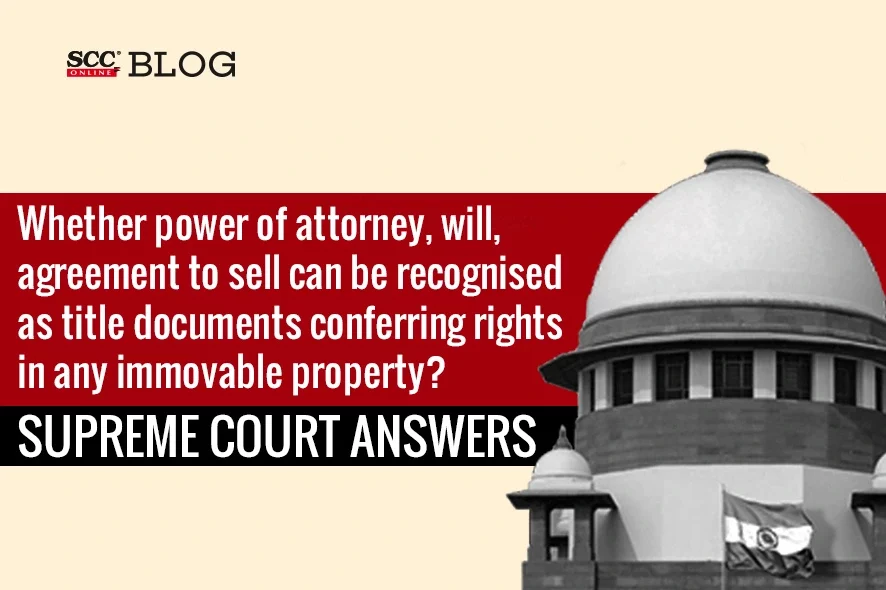Supreme Court: After having lost from all the three courts below, the defendant (appellant) to the eviction suit has preferred this appeal, wherein the division bench of Dipankar Datta and Pankaj Mithal*, JJ. said that the respondent is in settled possession of the suit property at least in part performance of the agreement which cannot be disturbed or disputed by the transferer, i.e., the appellant. Thus, it was held that the respondent is entitled for a decree of eviction with mesne profits, and there is no error or illegality in such a decree being passed. Further, it was held that will or general power of attorney cannot be recognised as title documents or documents conferring rights in any immovable property.
Background:
The respondent instituted a suit for eviction of the appellant from the suit premises and for mesne profits, on the averment that he is the owner of the said property by virtue of an agreement to sell, power of attorney, a memo of possession and a receipt of payment of sale consideration as well as a “will” of the appellant bequeathing the said property in his favour.
The appellant contested the suit on the ground that the aforesaid documents have been manipulated on blank papers but did not dispute the execution of any of them or that the possession memo was not executed or that the sale consideration as per the agreement was not paid.
The Trial Court held that there is no evidence to prove that any of the above documents were obtained by misrepresentation, manipulation or by playing fraud upon the appellant. The respondent has proved his right over the property. Since the licence of the appellant stands determined, he is entitled to a decree of eviction and payment of mesne profits though not at the rate claimed by the respondent, but at the rate of Rs. 1000/- per month for the use and occupation of the premises in dispute.
Issue:
Whether the power of attorney, the will, the agreement to sell, coupled with possession memo and the receipt of payment of sale consideration would confer any title upon the respondent to entitle him to a decree of eviction and mesne profits?
Analysis:
The Court after viewing Section 54 of the Transfer of Property Act, 1882, said that the agreement to sell is not a document of title or a deed of transfer of property by sale and as such, may not confer absolute title upon the respondent over the suit property. Further, the agreement to sell, the payment of entire sale consideration as mentioned in the agreement itself and corroborated by the receipt of its payment and the fact that the respondent was in possession of the suit property in accordance with law as is also established by the possession memo on record, proved that the respondent is having possessory rights over the suit property in part performance of the agreement to sell. This possessory right of the respondent is not liable to be disturbed by the transferer, i.e., the appellant. The entry of the appellant over part of the suit property subsequently is simply as a licencee of the respondent. He does not continue to occupy it in the capacity of the owner.
The Court said that the power of attorney executed by the appellant is of no consequence as on the strength of said power of attorney, neither sale deed has been executed nor any action pursuant thereof has been taken by the power of attorney holder which may confer title upon the respondent. Non-execution of any document by the general power of attorney holder consequent to it, renders the said general power of attorney useless.
The Court said that the ‘will’ executed by the appellant in favour of the respondent is meaningless, as the will, if any, comes into effect only after the death of the executant and not before it. It has no force till the testator or the person making it dies. The said stage has not arrived in the present case and, therefore, even the ‘will’ in no way confers any right upon the respondent.
Further, the Court said that the practice, if any, prevalent in any State or the High Court recognising power of attorney and will to be documents of title or documents conferring right in any immovable property is in violation of the statutory law. Any such practice or tradition prevalent would not override the specific provisions of law which require execution of a document of title or transfer and its registration to confer right and title in an immovable property of over Rs. 100/- in value.
[Ghanshyam v. Yogendra Rathi, 2023 SCC OnLine SC 725, decided on 02-06-2023]
*Judgment Authored by: Justice Pankaj Mithal
Know Thy Judge| 5 Judges who have received President’s nod for appointment as Supreme Court Judges








Excellent article! The detailed discussion on the recognition of Power of Attorney, Will, and Agreement to Sell as title documents is incredibly insightful. It provides clarity on property rights and legal implications.